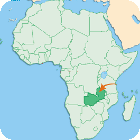Plant breeding programs in Zambia
The republic of Zambia is a landlocked country in Southern Africa. The agricultural sector accounts for 85% of total employment and represents 20% of the GDP (2000). Nevertheless, Zambia’s large potential in agriculture remains under-exploited. In fact, while 58% of land (4.2 million hectares) is classified as medium to high potential for agricultural production, only 14% is cultivated. Over 70% of households still grow maize as the major staple crop. Nevertheless trends show increases in more profitable, drought resistant food crops such as sorghum, cassava, millet and tubers.
Nevertheless, Zambia’s large potential in agriculture remains under-exploited. In fact, while 58% of land (4.2 million hectares) is classified as medium to high potential for agricultural production, only 14% is cultivated. Over 70% of households still grow maize as the major staple crop. Nevertheless trends show increases in more profitable, drought resistant food crops such as sorghum, cassava, millet and tubers.
The public sector of plant breeding research in Zambia, represented by 5 organizations, is active since 1954 while the private sector, represented by only 2 organizations is there since 1986. However the private sector devotes a much larger proportion of its budget to crop improvement compared to the public sector.
Maize is the most important crop in Zambia and receives an overall average of 60.6% of budget allocations for plant breeding research. This is followed by cotton, wheat and sorghum and millets. The plant breeding programmes in Zambia do in general respond to farmers’ needs. Both the public and private sector are attempting to develop varieties with tolerance to biotic and abiotic stress. The devastating maize fungal disease called Grey Leaf Spot (GLS) is of great concern.
The limitations to the success of plant breeding programmes in Zambia include the low number of plant breeders at MSc. or Ph.D levels, and the lack of policy on the ownership on public bred varieties.
Research and education institutes with activities in plant breeding
Public Institutes
 |
University of Zambia
|
 |
Soils and Crops Research Branch (SCRB)
|
Private Institutes
 |
SEEDCO LTD
|
 |
Maize Research Institute Seed (MRI Seed)
|
 |
Cotton Development Trust (CDT)
|
______________________________________
Information by Davies M. Lungu (2006). - Information based on the Zambia's full report from the PBBC survey. Last revised 26-06-2010, GIPB.
